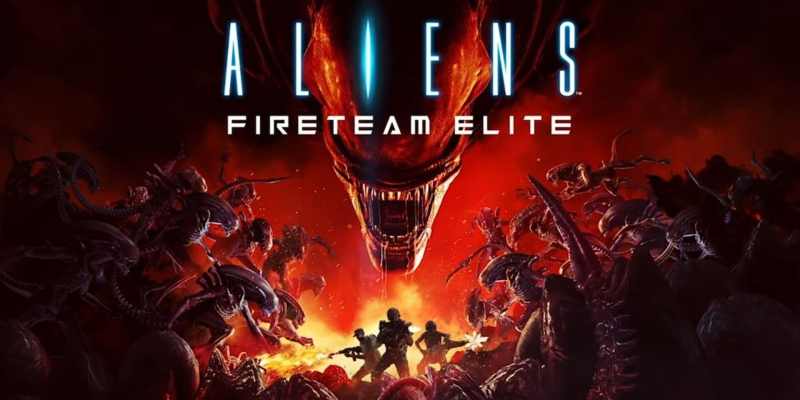It feels like I’m watching two IPs passing each other like ships in the night. Where Star Wars continues to struggle to rediscover the interconnective storytelling that made me fall in love with its expanded universe, Alien of all things is displaying how to do it right. You wouldn’t think a franchise with as troubled a development history as Alien could turn around and nail that sort of multimedia narrative, yet here we are with Aliens: Fireteam Elite.
You could tell with the prequel novel Aliens: Infiltrator that there was greater ambition to make Fireteam actually mean something to the setting as it knits countless projects together. With the benefit of hindsight, even more of what’s featured in the book factors into the game, such as the mutated rats and ties to Prometheus nestled in alongside nods to Dark Horse’s contributions. As Jesse noted in his review, the story tries far harder than it ever needed to, but it goes deeper than that. Aliens: Fireteam Elite might just be the perfect way to introduce fans to a proper Alien universe of stories.
To put things into context — for decades, the Alien and Predator continuities were pretty muddied due to how scattered the twin-pronged franchise had become. Rough-and-tumble retcons like the opening of Alien 3 and Corporal Hicks’ subsequent resurrection in Aliens: Colonial Marines weren’t uncommon. Being a tie-in didn’t hold much weight for the longest time.
However, back in 2014, with the launch of Alien: Isolation, a new wave of stories rolled out, expanding on and canonizing lore. These were followed in 2016 by the action-packed Aliens: Defiance comic about a new Colonial Marine, Zula. Then in 2019, Zula and Isolation’s Amanda Ripley crossed paths, canonically no less, co-starring in a few stories together. Through their journeys, we see the beginnings of the war between the Colonial Marines and the Xenomorphs brewing on the fringes of the galaxy while Ellen Ripley floats along in cryostasis.

Amanda has flourished as a new lead heroine. Unlike with her mother, Amanda’s destiny isn’t set, permitting her to appear across media, something the series subsequently capitalized on with Alien: Echo and Infiltrator, each adding new heroes with Olivia Shipp and Tim Hoenikerr respectively. It’s no longer a franchise about the increasingly inconsistent direction of the films, but story arcs that span multiple projects, with Aliens: Fireteam Elite bringing the most together.
What’s brilliant about this is how subtly Aliens: Fireteam Elite injects lore and weaves long-running threads together as you blast through hordes of Xenomorphs. Of course Pala Station’s synths were so ineffective at fighting the Xenomorph outbreak — they’re hand-me-down Seegson models from the days of Alien: Isolation. No wonder we haven’t heard of Weyland-Yutani’s research on these fringe worlds — it’s found more relics of the Engineers than even seen in Prometheus, and now those corporate suits are tightening their grips on the technology. The first boss of the game is the final “boss” of Infiltrator’s story, skulking about for Hoenikerr, ready to drown him in her acid.
But it goes deeper than pure explanations. Shipp returns as your CO, having enlisted in the Marines long ago to fight back against the threat that killed her parents. Her being so busy and respected holds precedent because, for fans keeping up with her story, she’s earned it. For every collectible found across Aliens: Fireteam Elite’s world, you can learn about Shipp and more — there’s even information on a story Dark Horse canceled due to misconduct allegations against its writer.
It’s clear with every step you take and tale uncovered that there’s a much vaster world to Alien than Ellen Ripley. Hyperdyne Systems and other corporations are compelling in themselves but also used to expand on reasonable questions, like why Colonial Marines insist on older-looking gear when fancier models are available. One of your crewmates is an intelligence spook with knowledge of all manner of mysteries, eagerly giving you the declassified answers while teasing at greater power plays among the Colonial Marines, Earth, its colonies, and the corporations scheming to control them all.

And in what might be one of the most delicate acknowledgements and retcons in the history of the franchise, Aliens: Fireteam Elite actually uses the salvageable parts of Aliens: Colonial Marines lore — while ignoring the actual game. Weapons and Xenomorph variants first brought to the fore by the infamous FPS are resurrected here, with a winking acknowledgement of the fresh start as your tactical advisor calls out, “An acid-spitting Xeno?! I’ve never seen one of those before!” in the earliest mission. The humorously animated Boiler Xenomorph is now the sprinting, dangerous Burster Xeno.
Even the idea of a UCM vs. Weyland-Yutani war is harnessed — just not the one Gearbox intended. Instead, players are treated to tales of a war with real stakes and betrayal. Nobody needed Fireteam to have unlockable recounts of these stories, but goodness is it delightful to see someone competently expand on the idea without breaking two films’ worth of continuity. This same delicate approach can be seen in the ties to Prometheus and the blissful, delightful surprise that nobody mentions a word about Alien: Covenant.
I realize that might sound odd. “Wait, so it’s better at being an expanded universe story by ignoring certain things?” Well, yeah. That’s the big lesson that Star Wars originally understood. Sometimes you have stories that are great and you want to expand on, like Alien: Echo, Defiance, or Isolation. Other times, you want to sidestep a problematic story while still rescuing what parts worked in it. Aliens: Fireteam Elite does this marvelously, not just for the films but other tie-in materials.

Similarly, by not being the only active storyline at present, nor the definite end for its cast, there’s room for Tim and Olivia to grow both with future content updates and in other projects. We may never see another Alien: Isolation, but Amanda Ripley’s journey continues to this day, as does Zula’s. These new Alien heroes might not hold the cultural cache of Ellen Ripley or Doctor Shaw, but that’s honestly to their benefit. These four can go and do whatever makes sense to them. By resting just on the edge of the radar, they’re relevant to those that care and free of the real-life corporate bureaucracy that’s doomed other certain science fiction franchise protagonists.
To offer an anecdotal example of the franchise’s success, I had no idea the Alien IP was exploding like this around half a year ago. Then with just slight exposure to its current offerings, I suddenly had a wishlist of books and comics. I’m eagerly playing through the latest updates to Fireteam! For the first time in a long time, I’m legitimately curious to see what’s coming next in a major IP because I can’t predict it. You just don’t get that scrappy unpredictability with bigger settings like the Marvel Cinematic Universe. Will Zula or Amanda appear at some point in a future Fireteam update? I dunno! Maybe! Crazier things have happened in this franchise.
What Aliens: Fireteam Elite promises for the future of the IP fills me with the same curious wonder Star Wars’ many tales used to, and I’m incredibly grateful to be enjoying this new era for the Alien franchise. Yet, one of the best parts of all may be how optional it is. Just like with the best expanded universes, if you don’t care about any of this stuff (in which case, uh, thanks for reading the article regardless!), Aliens: Fireteam Elite works perfectly fine as its own story. You don’t have to read any of the above mentioned books or comics or watch any of the movies after Aliens. Yet it makes you want to. That Fireteam inspires such a strong curiosity for those who care, guiding you to a vaster story, is a true achievement.
